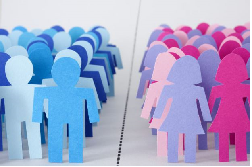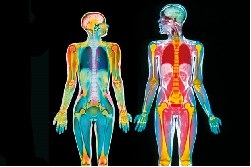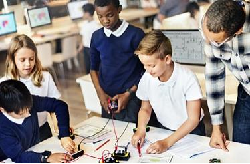April 2018 Research, Science and Knowledge
Read the articles selected in April 2018
Maximising the benefits of Artificial Intelligence through future-proof rules on Text and Data Mining
Source: http://www.eua.be/
In the race to develop AI for economic growth and increased competitiveness in Europe are needed machine-based analyses of large amounts of data. Eua calls on the EC to consider a broader exception on Text and Data Mining and beyond the public sector in the European directive on Copyright.
Read more:
Maximising the benefits of Artificial Intelligence
Source: European Commission
To advance AI in Europe is crucial to empower the availability of public sector data and their re-usability across borders. To extract maximum value from information and research results is needed an environment of trust and accountability for citizens and business at protection of their fundamental freedoms.
Read more:
UK’s share of EU research funding drops after Brexit vote
By David Matthews
Source: Times Higher Education, 26 April
According to recent government figures, the UK’s share of European research funding programmes has been sinking since Brexit. Uncertainty over the UK’s position in the EU plays as an unwanted element of risk that makes UK researchers less competitive in the application for funding or is deterring them from applying.
A critique of the concept of lifelong learning in the contemporary world: an existential critical approach
By Babak Shamshiri & Amin Izadpanah
Source: Educational Alternatives, Volume 15, 2017
While seeking and finding truth throughout life has been an old religious and philosophical concern, in the modernity life-long education has acquired a meaning of adaptation to the technological dimension of life, which can become in an existential perspective a way of self-actualization and self-consciousness.
Read more:
https://www.scientific-publications.net/get/1000027/1504206047666454.pdf
EUA Big Deals Survey Report
Source: http://www.eua.be
Eua’s Big Deals High-Level Group gathers information about the evolution of the contractual schemes between major scientific publishers and universities to ensure a fair and transparent publishing system and to help researchers to diversify the ways of dissemination of their research.
Read more:
The Future of Education and Skills Education 2030
Source: http://www.oecd.org
Oecd’s Learning Framework for 2030 and the International Curriculum Analysis intend to identify the skills needed in the future of our children, profiling a clearer vision and the objectives of education systems, building a knowledge base that will help countries to enhance the quality of their teaching workforce.
Read more:
http://www.oecd.org/education/school/Flyer-The-Future-of-Education-and-Skills-Education-2030.pdf
Elearning and intercultural pedagogy: maximising study abroad
By Jane Jackson
Source: Educational Alternatives, Volume 15, 2017
The technological development has changed the experience of studying abroad in a way which can reduce the opportunities for intercultural exchanges. Nevertheless, technologies have a constructive impact on international education, to be enhanced in its effectiveness through the critical role of the cultural mentor.
Read more:
https://www.scientific-publications.net/get/1000027/1504205979511428.pdf
La langue française vaut bien un combat judiciare
By Bernard Sergent
Source: Libération, 16 April
In France is open the debate on the defense of French in the public universities, after several administrative rules that have sanctioned a federation of institutions with an English name and the recent sentence of the Italian Constitutional Court about the courses taught only in English.
Read more:
http://www.universityworldnews.com/article.php?story=20180413085603948
Nations join emerging multi-polar global science system
By Yojana Sharma
Source: University World News, 13 April
The growth in research output among scientifically advanced countries is due to the international dimension of many important scientific projects, that have shaped a world network which generates national and local benefits, but needs the free flow of ideas and people.
Read more:
http://www.universityworldnews.com/article.php?story=20180413085603948
The Resilience of Students with an Immigrant ackground
Source:http://www.oecd.org/

In OECD countries, at least one in four 15-year-old students is originating from a foreign country. In front of this fact, education maintains social cohesion providing migrants with skills needed for their economic integration and contributes to their social and emotional well-being.
Read more:
STEM is losing male LGBQ undergrads
By Katie Langin
Source: Science, 14 March

The devaluation of feminity in STEM is true also in relation to LGBQ minorities. While LGBQ women are more likely to persist in STEM than the heterosexual ones, heterosexual men are more likely to remain in this field than their LGBQ peers.
Read more:
A Regional Innovation Impact Assessment Framework for Universities
By Koen Jonkers, Robert Tijssen, Athina Karvounaraki &Xabier Goenaga
Source: the European Commission
This report proposes a targeted funding system for higher education to respond to the social needs and meet the requirement of effectiveness, equity and efficiency designing an assessment system of the regional impact of universities performance and innovation.
Gender pay gap: how much less are women paid at your universities?
By Rachael Pells
Source: Times Higher Education, 6 Aprile

A study in the UK universities reveals a gender pay gap in an average of 15% compared with the 9,7% of other sectors. Among the institutions with the highest gap, 13 belong to the prestigious Russel Group and are broadly research-intensive or including medical schools.
Read more:
Academic freedom is essential to democracy
di Patrick Blessinger & Hans De Wit
Fonte: University World News, 6 Aprile
Academic freedom as derived from freedom of thought is implicit in the production and delivery of knowledge, both humanistic and scientific, and reverberates on the whole society, contributing to the human progress. Before the obstacles conditioning it, we should not forget that it is a common good.
Read more:
http://www.universityworldnews.com/article.php?story=20180404101811251
The Design of Missions in the Next Framework Programme
Source: http://www.eua.be/
Mission-oriented R&I amplifies the support for core European values and the grand challenge spoken in the language of the UN SDGs. Universities are innovative ecosystems that can increase the social benefits of science if driven by research excellence in a realistic perspective.
Read more:
Skills for the 21st century
By John P. Martin
Source: http://www.oecd.org
The Programme for International Assessment of Adult Competencies (PIAAC) evaluates the proficiency in literacy, numeracy and problem-solving of working-age populations in Oecd countries to help governments to develop policies and investments on the base of the analyses delivered.
Read more:
https://read.oecd-ilibrary.org/education/skills-for-the-21st-century_96e69229-en#page1
2018 March for Science will be far more than street protests
By Jeffrey Mervis
Source: Science, 4 April

The March for Science, begun in the USA last year, has become a worldwide movement with diversified activities in support for research, from the protest against funding cuts and restrictions to mobility to the promotion of the value of evidence and international collaboration.
Read more:
http://www.sciencemag.org/news/2018/04/2018-march-science-will-be-far-more-street-protests
Stop funding research that ignores sex and gender, says expert
By Rachael Pells
Source: Times Higher Education, 4 April

Lack of consideration for gender differences in medical studies can cost lives and the withdrawal from markets of expensive drugs. The inclusion of this biological variable should be introduced as a requirement for public funding.
Read more:
https://www.timeshighereducation.com/news/stop-funding-research-ignores-sex-and-gender-says-expert
Want to crowdfund your science? New study hints at who is successful
By Jeffrey Brainard
Source: Science, 26 March

Crowdfunding is an emerging source of science funding, more tailored to students and postdocs than tenured academics. The key to success is the request of relatively small amounts and the social value of the research projects. Anyway, crowdfunding is complementary to institutional funding.
Read more:
http://www.sciencemag.org/news/2018/03/want-crowdfund-your-science-new-study-hints-who-successful
Innovation in everyday teaching: no more waiting for Superman
By Alejandro Paniagua
Source: http://www.oecd.org, 8 February

Oecd ‘s Innovative Pedagogies for Powerful Learning (IPPL) identifies six clusters pedagogies to orient teachers in the lack of a common international framework of innovative models, enhancing the role of teachers in promoting the new skills and learning goals.
Read more:
École: les emotions au premier rang
By Pascal Senk
Source: Le Figaro, 5 February
The recent discoveries of neurosciences confirm the crucial role of the relation children-adults played at school. The well-being and the exercise of the emotional resilience, with the presence of a benevolent and not judging authority improve scholars’ and teachers’ performances.
UK and US researchers “less likely to share research data”
By Simon Baker
Source: Times Higher Education, 26 March

After a survey run on 7.700 researchers worldwide, the importance of sharing data generated by research is broadly perceived but put into practice with variations across countries and by subject, that depend on the lack of support and education on data management.
Read more:
https://www.timeshighereducation.com/news/uk-and-us-researchers-less-likely-share-research-data
EUA calls for comprehensive view on academic cooperation in Brexit negotiations
Source: http://www.eua.be
The negotiations for Brexit should include a deal on academic cooperation between the EU and the UK, where should be defined the position of the UK in relation to the Framework Programme for Research and Innovation, the Erasmus+ and other European initiatives.
Read more:
Info
- Pubblicato il : 07/05/2018 Modificato il : 04/04/2019

